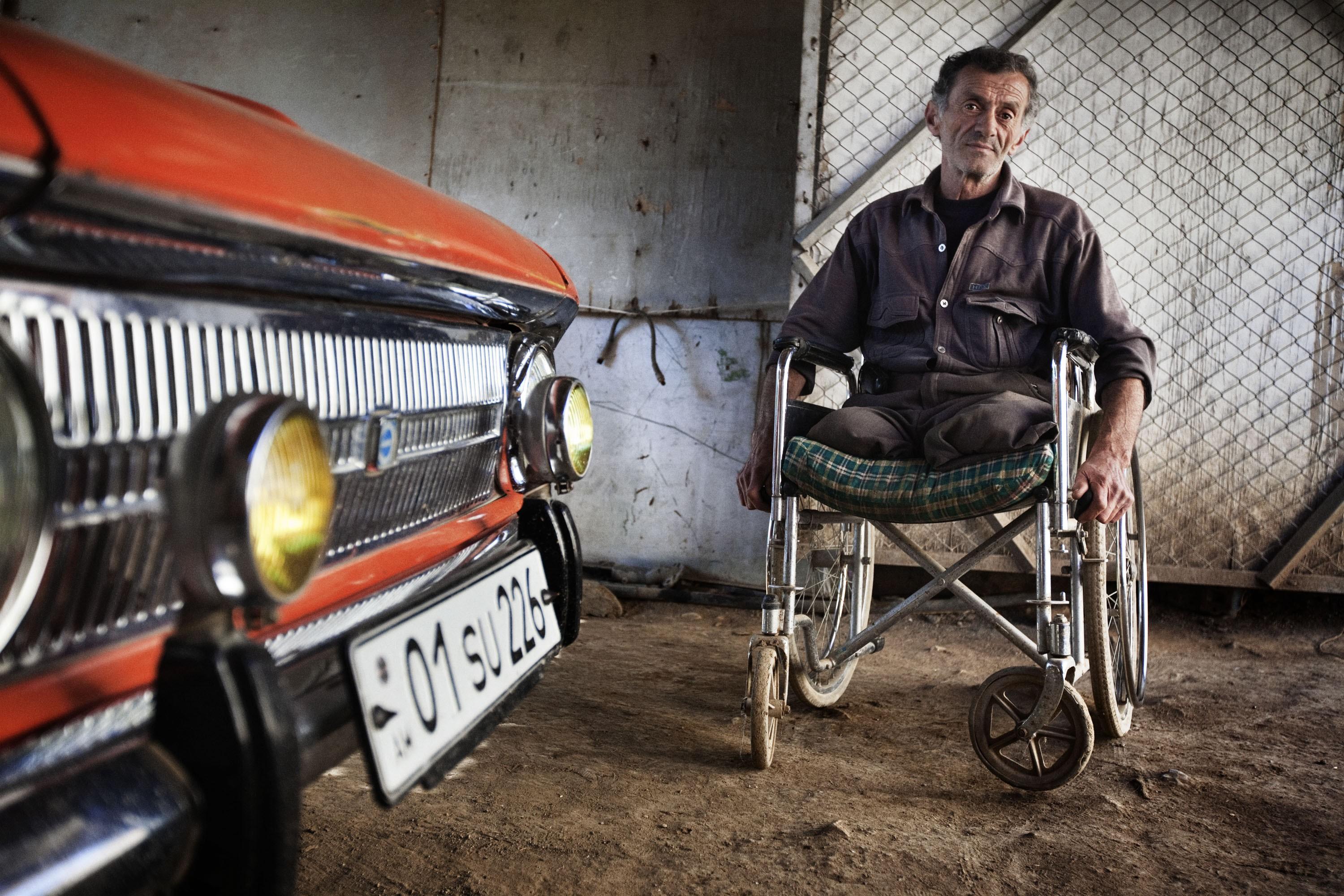
Artsakh Diary: Disabled War Vet Vows to Remain Active
Narek Avagyan – “I’ll keep on working till the day I die”
We met up with Narek in the village of Tzamdzor, some 45 kilometers southwest of the town of Hadrut, in Artsakh. He was about to go to the fields. There was some kind of problem with his son’s tractor.
Your typical day in a rural Artsakh community: except for the fact that Narek was in a wheelchair.
57 year-old Narek Avagyan was born and raised in Tzamdzor. He was still living in the village when conscripted in the Soviet army. After getting out, Narek moved to Martakert and learnt how to become a mechanic.
When the Artsakh War broke out he, like many others, volunteered. “I’ve lived my whole life here. During the war, I served as a tank driver,” he says.
He’s long lost count of the burns and the conclusions suffered during the war years. The enduring reality of the war starkly appears when you look at him – Narek lost both legs.
Landmine costs him his legs
“At first, it was just some burns and cuts; nothing major. Later on, a landmine blew up near the Azeri school in Hadrut. A piece of shrapnel injured my right leg. I gave it no thought, thinking it would heal. But I wound up losing both legs. They operated on them five times,” Narek recounts.
Narek’s been trying to come to grips with his disability for the past eight years. He confesses that it was tough going at first. “If you can’t sit, stand up or move about, what kind of life is that?” he asks.
Today, he gets around in a wheelchair. If Narek has to travel further afield he gets in his orange Moskvitch, that he’s modified himself. You’ll never see Narek sitting idly by. The man always keeps busy and continues to repair cars, even though such work isn’t easy given his condition.
“What good would come from sitting at home? I’d keel over from boredom. I’ll work till I die. There are the children to take care of. Who can run a household on just one income nowadays?”
Narek lives with his elderly parents and his younger son, recently discharged from the army. His daughter and other son are married and live separately. Narek’s wife had a nervous breakdown during the war. He says she passed away after taking care of her for twelve years. But he has no complaints.
“That’s life for you. You have to take care of your own because no one else will,” Narek says.
No military pension
The Avagyan household lives on 90,000 AMD per month (about $250). It’s the old age pension of his parents and his disability payments.
“Since I wasn’t treated at a military hospital, I don’t receive an army pension. I applied several times and submitted the paperwork, but nothing’s happened. They wanted a bribe but back then I had nothing to give,” Narek recounts.
Narek states that while the family’s monthly income might seem like a nice amount of money on the face of it, they are forced to drive to Hadrut several times a month for the basic necessities. There are no stores in the village.
Changes in the weather cause strong spasms in the remaining parts of Narek’s limbs. These convulsions can last from one hour to one day; occasionally up to a week.
“I probably only have about three liters of blood circulating in my body. That’s why I can’t tolerate extreme heat or cold. There’s really no medicine that helps. I either squeeze my legs hard or tightly wrap them in bandages.”
Flashbacks of war years
The pain gets so strong that Narek can’t sleep at night. Lying awake, he has flashbacks of the war. They never leave him.
“The pain causes my head to tighten and that’s when the war flashes before my eyes. I relive how me and my buddies escaped death several times; how we got burnt in the tank. I think about where we have ended up. To get my head straight, I come out to the balcony for a smoke. The sun is just rising and I am still wrestling with my thoughts.”
Narek hasn’t been to see a doctor for the past few years. He says it would be just a waste of time and just more needless agitation. He says that nothing will bring back his legs.
Narek has heard that his only hope for some degree of mobility lies overseas, with the assistance of advanced prosthetics. But this remains a distant dream given his lack of finances.
“I’ve been waiting here since morning for my friend’s daughter-in-law to come and help me in the car. I can maneuver the wheelchair down steps and all but it’s impossible to get around in the bumpy yard.”
Narek checks the car one last time. He’s heading off by himself and doesn’t look forward to getting stuck somewhere between here and there.
Photo by Francesco Aless
 Videos
Videos Photos
Photos




Write a comment